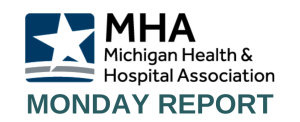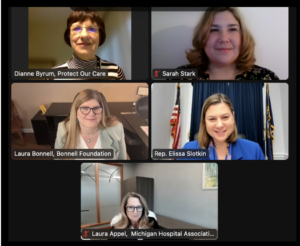


In the House, representatives voted in support of legislation that would increase the fines for assaulting a healthcare professional or volunteer. House Bills (HBs) 4520 and 4521 were introduced by Reps. Kelly Breen (D-Novi) and Mike Mueller (R-Linden), and are supported by the MHA. The bills seek to double the fines for assault and assault with a deadly weapon against healthcare workers to deter future attacks from happening. Several MHA members testified in support of the bills in June, which now head to the Senate’s Health Policy Committee for further consideration.
The House also took votes on a package of bills intended to preserve Affordable Care Act (ACA) protections in Michigan law. Introduced in both chambers by Republican and Democratic policymakers, the package would ensure that many of the consumer protections found in the ACA remain in Michigan regardless of any federal changes to the law. The package includes Senate Bills (SBs) 356 through 358 and HBs 4619 through 4623. The MHA is supportive of the package, which has been passed in at least 15 other states. HB’s 4619 through 4623 were passed by the full House during the week of June 26 and will move to the Senate for more action later this year.
On the Senate side, a full floor vote was taken on legislation to prohibit insurance discrimination against living organ donors. SB 384 was introduced by Senator Kevin Hertel (D-St. Clair Shores) and would prevent insurance companies from denying, canceling, refusing or otherwise varying an individual’s insurance policy if they choose to become a living organ donor. A living organ donor is a healthy person who donates an organ, usually a kidney or part of their liver. The MHA is supportive of the bill, which will now head to House Health Policy Committee.
Several bills were passed through both chambers during the week, moving to the Governor’s desk for final signature into law. This included HBs 4495 and 4496, introduced by Reps. Graham Filler (R-St. Johns) and Will Snyder (D-Muskegon), which would eliminate burdensome provisions in the Healthy Michigan Plan and make changes to help ensure the program’s long-term success. The package would remove requirements that certain beneficiaries maintain Health Savings Accounts and pay co-pays or deductibles. Additionally, the bill removes the provision that a future administration could repeal the program if state savings are reduced. The MHA is supportive of HBs 4495 and 4496.
Also heading to the Governor’s desk is a package of bills that would allow Michigan citizens to designate themselves as an organ donor on state tax forms. Introduced by Rep. Felicia Brabec (D-Pittsfield Twp), HBs 4362 through 4364 would allow the question to be asked on tax forms starting in the 2023 tax year. The MHA is supportive of the legislation, which is led by Gift of Life Michigan to reverse the decline in donor registrants. Gift of Life Michigan testified in committee that many states are seeing this because of the pandemic and online services leading to fewer trips to Secretary of State offices.
A bill introduced by Sen. Sylvia Santana (D-Detroit) would increase access to vaccines and certain laboratory tests passed both chambers as well. SB 219 would allow pharmacists to order and administer immunizations and certain diagnostic tests for their patients without physician supervision. Under the current language, pharmacists wishing to provide these services must also complete some additional training courses as part of their licensure process. The MHA is supportive of SB 219, which now awaits a decision from the Governor.
Legislation to ban conversion therapy for minors is also heading to the Governor’s desk. HBs 4616 and 4617, introduced by Reps Felicia Brabec (D- Pittsfield Township) and Jason Hoskins (D-Southfield), would prohibit mental health professionals from providing conversion therapy to a minor. Conversion therapy refers to the practice of trying to change an individual’s sexual orientation or gender identity. The MHA is supportive of the bills which passed both chambers and were ordered enrolled, now awaiting formal presentation to the Governor.
Also of note was the introduction of HB 4833 by Rep Ranjeev Puri (D-Canton Township), which would make clarifications to Michigan’s substance use disorder (SUD) licensure statute. HB 4833 would ensure that hospitals, psychiatric hospitals, and individuals otherwise licensed to provide SUD prevention services be exempt from duplicate licensure. The MHA is supportive of the bill introduced to the House Health Policy Committee.
A package of bills was re-introduced and sent to the governor during the week of June 26 to help prevent medical sexual misconduct. Originally introduced during the 2017-2018 legislative session, the bills would make several changes to help prevent sexual assault and abuse against minors. Several bills within the package create new requirements and guidelines for hospitals and healthcare providers, including:
- SB 69 through 72, which would require medical records involving vaginal or anal penetration to be retained for at least 15 years and an additional adult to be present for sensitive exams.
- HBs 4121 and 4122, which require license revocation of a medical professional convicted of sexual contact under the pretext of medical treatment.
- SBs 67-68, which prohibit sexual contact under the pretext of medical treatment.
- HB 4120, which requires employers of mandatory reporters, like hospitals, to distribute training materials.
Members with questions about state legislative action may contact Adam Carlson at the MHA.












